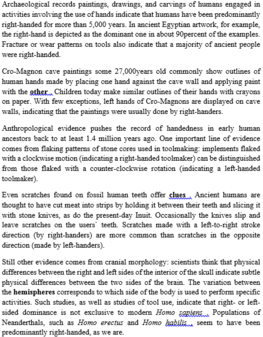Read the following passage andmark the letter A, B, C, or D on your answer sheet to indicate the correctanswerto each ofthe questions from 43 to 50.
Most of us know a little about how babies learn to talk. From the time infants are born, they hear language because their parents talk to them all the time. Between the ages of seven and ten months, most infants begin to make sounds. They repeat the same sounds over and over again. This is called babbling. When babies babble, they are practicing their language.
What happens, though, to children who cannot hear? How do deaf children learn to communicate? Recently, doctors have learned that deaf babies babble with their hands. Laura Ann Petitto, a psychologist, observed three hearing infants with English-speaking parents and two deaf infants with deaf parents using American Sign Language (ASL) to communicate. Dr. Petitto studied the babies three times: at 10, 12, and 14 months. During this time, children really begin to develop their language skills.
After watching and videotaping the children for several hundred hours, the psychologist and her assistants made many important observations. For example, they saw that the hearing children made varied motions with their hands. However, there appeared to be no pattern to these motions. The deaf babies also made different movements with their hands, but these movements were more consistent and deliberate. The deaf babies seemed to make the same hand movements over and over again. During the four-month period, the deaf babies' hand motions started to resemble some basic hand-shapes used in ASL. The children also seemed to prefer certain hand-shapes.
Hearing infants start first with simple syllable babbling, then put more syllables together to sound like real sentences and questions. Apparently, deaf babies follow this same pattern, too. First, they repeat simple hand- shapes. Next, they form some simple hand signs and use these movements together to resemble ASL sentences.
Linguists believe that our ability for language is innate. In other words, humans are born with the capacity for language: It does not matter if we are physically able to speak or not. Language can be expressed in different ways - for instance, by speech or by sign. Dr. Petitto believes this theory and wants to prove it. She plans to study hearing children who have one deaf parent and one hearing parent. She wants to see what happens when babies have the opportunity to learn both sign language and speech. Does the human brain prefer speech? Some of these studies of hearing babies who have one deaf parent and one hearing parent show that the babies babble equally with their hands and their voices. They also produce their first words, both spoken and signed, at about the same time. More studies in the future may prove that the sign system of the deaf is the physical equivalent of speech.
Adapted from “Issues for Today” by Lorraine C. Smith and Nancy Nici Mare
According to paragraph 1, babies begin to babble ___________.
A. at their first moment after birth
B. at their first experience of language
C. when they are more than 6 months old
D. when they first hear their parents talk to them




Đáp án C
Theo đoạn 1, trẻ con bắt đầu bập bẹ................
A.ngay khi vừa sinh ra C. khi chúng hơn 6 tháng tuổi
B. trải nghiệm đầu tiên về ngôn ngữ D. khi lần đầu nghe bố mẹ trò chuyện với chúng
Dẫn chứng: Between the ages of seven and ten months, most infants begin to make sounds. They repeat the same sounds over and over again. This is called babbling.